 |
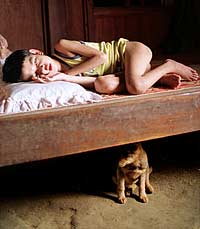 |
| |
Pham
Quoc Huy, 12, rests on a cot in his home near the village of Dong Son, in Vietnam's
central highlands. Of the town's 1,078 residents, 272 report being disabled by
illnesses. They blame the defoliants sprayed from U.S. planes during the Vietnam
war. (AP Photo/Richard Vogel) |
DURING
THE VIETNAM WAR
there, the United States sprayed the herbicide Agent Orange over thousands
of square miles of jungles. The tropical canopy was destroyed so that the Vietcong
could not hide in the foliage. For years, American veterans who fought in Vietnam
have claimed they suffer from diseases caused by Agent Orange - especially by
a chemical in the herbicide called dioxin. More than 7,000 veterans have been
compensated by the US government for exposure to Agent Orange, although scientists
say there is no conclusive evidence that the chemical caused their ailments.
In Vietnam, some people say you can see the legacy of Agent Orange in their
children. Just visit a former Vietcong soldier one evening at his tiny home in
Hanoi.
To get there you turn down a long, dark alley. Most Vietnamese houses are tucked
inside courtyards which smell musty, like charcoal and rice. You can tell you're
getting close to the veteran's home when you hear his songbirds.
The veteran's name is Nguyin Thanh Son. He says he fought during the war with
a Viet Cong anti-aircraft missile unit. Son's unit shot down dozens of American
planes. But he says the planes kept coming, and they blanketed the jungle with
Agent Orange. He says it looked like fog.
"We suffered with the eyes and with the smell, with the nose, and also
with our throat," Son recalls. "But at the time we did not know that
the consequences of Agent Orange could last for long."
When Son came home from the war, he and his wife started a family. They live
with their two children and their grandparents in a space that's about the size
of a typical American dining room. There's barely enough room for their beds and
a sewing machine and a rickety table where they serve tea.
Son gestures toward the bed right in back of us. There's a little girl with
pigtails lying on her back, tucked under a quilt so just her head is poking out.
She stares vacantly at the ceiling.
Son says she's not a little girl at all. She's almost 25 years old - born paralyzed.
"Her name is Nguyen Thuy Phuon. She is deaf," Son says. "She
cannot do anything. She cannot speak. She cannot listen. Just lie there."
 |
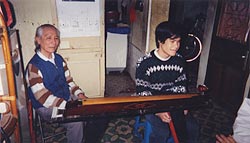 |
| |
Musician
Thanh Tung, right, at his one-stringed instrument. His father, Nguyin Thanh Son,
left, says the young man was born blind because Son was sprayed by Agent Orange
during the war. (D. Zwerdling) |
Son and his wife had a second baby. This time it was a boy, and this time their
child was born blind. Now the boy is a young man, and he explores the world in
his music. He's learning to play a traditional Vietnamese instrument, which looks
like a dulcimer on legs but it has only one string. The boy plucks the string
and a undulating note swirls in the air.
"I love this musical instrument very much because he can express all the
type of the sentiments of the human beings," the boy explains, bending a
note like a thick ribbon of sound. "The happiness, the sadness. It is so
sweet, like my mom's singing."
American Grass
 |
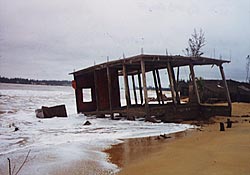 |
| |
A
village in central Vietnam devasted by recent floods. Some researchers believe
the damage was worsened by defoliated hillsides. (D. George) |
Nguyin Thanh Son's family symbolizes a question mark that hangs over Vietnam.
How has Agent Orange transformed the country? You can answer that question with
your own eyes. Drive up a dirt road into Vietnam's central highlands with a Canadian
named David Levy.
"The very lush jungle that existed here 30 years ago was wiped out by
the Agent Orange herbicide. And even today we don't see any recovery of the jungle
that used to exist here," Levy says.
Levy helps run an environmental consulting firm based in Canada that works
with the Vietnamese government on the Agent Orange problem. At the moment, we're
passing farm houses made of bamboo about an hour from the town of Hue. During
the war, the armies fought some of their biggest battles in this region, and US
planes doused the jungles with Agent Orange.
"The pesticide would come down as a very fine mist, and it would hit the
leaves of the trees," Levy says. "Within about a day, the leaves of
the trees would fall off and the tree would effectively be dead. Or, it would
fall over within the next month or so."
Levy says if we had come to Hue in the old days - before Agent Orange - the
hillsides in every direction would have been covered with thick forests. But now
the landscape looks bizarre. The hills are covered with a thick, green grass.
There's hardly a single tree in sight. Levy says this grass is like a monster.
Soon after the herbicide killed the jungles, the grass moved in. Now it won't
let the trees grow back.
The Vietnamese call it American grass.
"Unless humans intervene somehow in this environment to improve it, this
grass will last for centuries," Levy says.
The Vietnamese could reverse some of the damage from Agent Orange by tearing
up the hillsides and planting millions of trees, Levy says, but the government
can't afford to do much.
 |
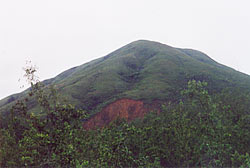 |
| |
In
Vietnam's central highlands, a hillside said to be defoliated by US warplanes.
(D. George) |
Agent Orange is creating other serious side effects. Levy shows us one hillside
with a huge brown gash in it. A whole chunk of the hill has fallen away. Now it's
just bare dirt. When Agent Orange killed the jungles, no tree and plant roots
were left to protect the soil from tropical rains. Erosion and landslides are
common.
The slides close roads, and which blocks farmers from getting their products
to market in Hue. "No question, people just to the west of here are very
dependent on this road just for their daily livelihood," Levy says. "They're
cut off for periods of days or weeks when these landslides occur."
At the fabled Perfume River, where Kings sailed centuries ago, Agent Orange
still fights its war - through flooding. Late last year it rained more than usual.
This river gushed out over its banks and wiped out whole villages. They were the
worst floods in 100 years. Scores of people drowned. Levy says the floods would
never have been that bad if the hillsides were still covered with forests.
If you ask Vietnamese about the most important legacies of the war, they don't
talk about erosion and floods. They talk about their families.
Human Damage
At the Center for Disabled Children in Hanoi, some of the children have stumps
where they should have arms or legs. Most of the children are mentally retarded.
The center's director is a pediatrician named Nguyen My Hien. She says she
founded the center specifically for victims of Agent Orange.
"These children are effected by dioxin from wartime," she says.
After the war ended, Dr. Hien says she and other physicians began to sense
that veterans were having an unusual number of babies with birth defects. Over
the years, she persuaded the Vietnamese government and foreign aid groups to fund
almost a dozen children's homes like this one. They call them Peace Villages.
At this branch in Hanoi, the children live in three cinder-lock buildings.
They're spare and clean. The walls are painted that minty hospital green. As we
talk in the hallway, a girl walks up.
"Good afternoon," she says in uncertain English. "My name is
Twa. I'm fine today. And you?"
"But she has some problem with skin, you see?" say Hien.
First we don't see her skin problem. Twa is 15 years old. And she looks like
a pretty young woman who happens to be wearing a black turtleneck under a white
shirt. But Hien tells us to look more closely. Twa's not wearing a black turtleneck.
Her entire body, from the top of her neck on down, is black and hairy. Hien lifts
the girl's shirt and shows us her back. It's covered with huge, sagging tumors.
"Very sad. Very, very difficult to treat her," Hien says.
Hien says Twa's father was sprayed with Agent Orange. As we’re looking
at her back, Twa tells more of the story. Others back home used to torment her
by saying her ailment made her like an animal.
"I'm very sad because my friend think that my skin look like buffalo,
look like a buffalo skin," Twa explains.
A Complicated Issue
When you talk to just about anybody in Vietnam they accept it as fact that
children like these are victims of Agent Orange. But American researchers say
the issue's more complicated.
Dioxin has probably caused serious health problems in Vietnam, but so far no
one has identified the right victims, according to Arnold Schecter, a public health
researcher at the University of Texas. Schecter has been studying the dioxin problem
in Vietnam for years.
Scientists know that dioxin is one of the most toxic chemicals ever studied.
And research in laboratory animals and humans suggest that, dioxin can cause diabetes,
cancer, and specific kinds of birth defects. But Schecter says most of the dramatic
birth defects that the Vietnamese cite have never shown up in the research. Most
of the children in the Peace Villages, he says, are probably victims of old-fashioned
plagues, like polio and cerebral palsy.
Schecter says scientists need to do major, long-term studies to figure out
who's really been affected by dioxin in Vietnam, and how.
"My best guess we're probably going to find that there are hundreds of
thousands of adults and children who have health problems from the dioxin in Agent
Orange," Schecter says. "So many have died."
 |
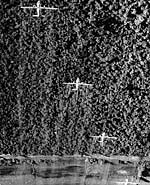 |
| |
Four
C-123 defoliation planes fly parallel to each other spraying defoliant over a
jungle in Vietnam on March 22, 1966. (AP Photo) |
Researchers have been trying for years to persuade the leaders of Vietnam and
the United States to study the problem together. Representatives from both countries
are trying to negotiate an agreement. But one Vietnamese researcher says that
officials in his own government are torn over this issue. During the war, Le Cao
Dai, a surgeon, was operating on wounded Vietcong in the jungle.
"In the morning, very early morning, before sunrise, I saw three plane
very, very high in the sky. And it seemed like a rain, a small rain, was falling
slowly from the sky," Dai says.
It was Agent Orange.
Since then, Dai's been studying dioxin for Vietnam's Red Cross. You'd think
that Vietnam's leaders would be anxious to prove that the American herbicide has
caused terrible problems. Not necessarily.
"They want to forget the past," Dai says. "It is policy of government
to close down the past, to want to be friendly with everybody, even Americans."
Dai says he's trying to convince his leaders that dioxin is not just a past
problem - that side effects from the chemical are hurting Vietnam now. Dai agrees
that scientists need to pin down who's been affected and how.
He says the legacies of Agent Orange are clearly so serious that it's time
to raise a sensitive topic - US financial support for victims of Agent Orange.
"I think that they should do it, that the US government should do something,"
he says..
Vietnam's own government hasn't done much to help people who think that dioxin
hurt them. At least, not until recently.
Nguyin Thanh Son and his wife have raised their disabled children - the paralyzed
daughter and the blind son - by themselves. Their daughter requires constant care.
The son is more independent, but he needs help getting around town. And the family
is poor.
Researchers like Arnold Schecter would argue that this family's problems probably
have nothing to do with the war. But Vietnamese leaders have just made an announcement.
They're going to give veterans $10 a month for every disabled child and sick adult
in the family, if they think their condition might be linked to Agent Orange.
And in Nguyin Thanh Son's family, $10 is more than enough to pay their son's way
through music school.
|

